Love Lies Bleeding: A Dark Fairytale On Steroids
The Kristen Stewart-starrer is a Lynchian romantic thriller that swaps the feral identities of lust and violence. It is strange, twisted and wonderfully addictive.

Last Updated: 06.20 PM, Apr 06, 2024
LOVE LIES BLEEDING is a passionate love story between two distinct genres of storytelling. One film is a bleak underdog drama whose protagonist, Jackie (Katy O’Brian), is an ambitious bodybuilder trapped within the role of a volatile outsider in a small town. The other film is a retro coming-of-age drama whose protagonist, Lou (Kristen Stewart), is a reclusive gym manager aching to escape the cycle of generational crime. When Jackie meets Lou, sparks fly. But they don’t fall for, so much as detonate each other. The consequent explosion is a Lynchian romantic thriller that swaps the feral identities of lust and violence. It is strange, twisted and wonderfully addictive.
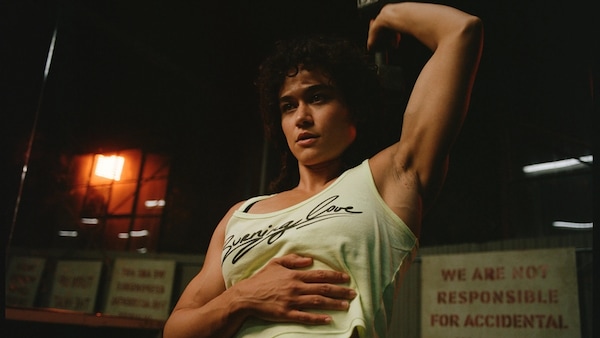
A homeless Jackie rolls into town and solicits work at the local gun range. Lou is so intoxicated by Jackie on their first night that she lets her move in; they can’t get enough of one another. The complications begin when the two women discover each other beyond sex and the fantasy of domestic bliss. Jackie learns of Lou’s skeletons: She is estranged from her devious dad (Ed Harris) who runs the gun range, and enraged with her abusive brother-in-law (Dave Franco) who batters her sister. In a fit of steroid-fuelled rage — but also overcome by crippling tenderness for an upset Lou — Jackie kills the brother-in-law. Lou is both appalled and aroused by Jackie’s ‘gesture’. Instead of simply covering up the crime, Lou decides to turn this event into her — their — exit strategy.
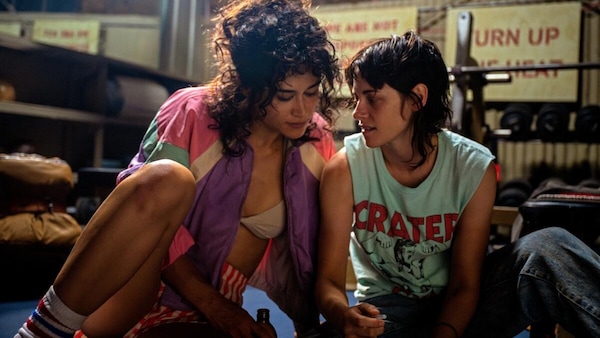
But nothing is seamless. Two FBI agents dig around, alerted by the vanishing of the family’s business rivals; Daisy, a lesbian who is crazy for Lou, becomes a vapid witness; Lou struggles to confront the trauma of being a sociopathic man’s daughter; a jacked-up Jackie still hopes to reach and win a bodybuilding competition in Los Angeles. All the loose ends threaten to morph into old beginnings. Both the women are novices in the field of not just crime but also romance. What follows is a savage odyssey of two embattled soulmates, where the title of the film functions as both a lyrical sentence and a description of three acts. Jackie and Lou love, lie and bleed for each other, but their love also lies bleeding in the face of insurmountable odds. Ironically, their sexual orientation — and interracial alliance — in a regressive 1980s setting remains the least of their conflicts.
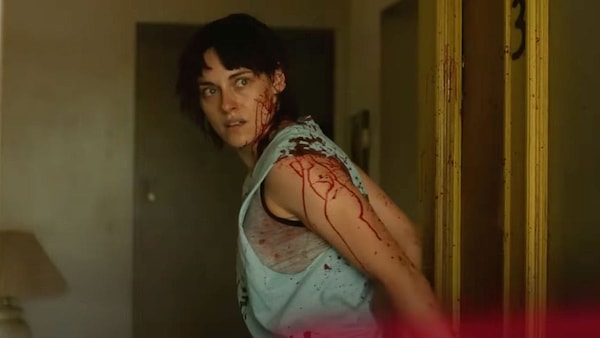
Rose Glass’ film unfolds like a reckless mood. There is no middle ground. The background details — like the dismantling of the Berlin Wall — evoke the falling of emotional barriers and the loss of the villain’s administrative power. Excessive declarations like killing for someone or cleaning up someone’s mess are literalised here: Jackie actually kills for Lou, and Lou spends much of the film wiping up Jackie’s mess and facing her own demons. One unravels, the other keeps it together — the crisis collapses into the sort of chemistry that movies are made to mine. What’s more, they keep preventing each other from spiralling into separate stories. At several points, it looks as if Jackie and Lou might betray one another and go their own ways. Forget being torn apart, they seem in perpetual danger of relapsing into the dark singularity of their lives.
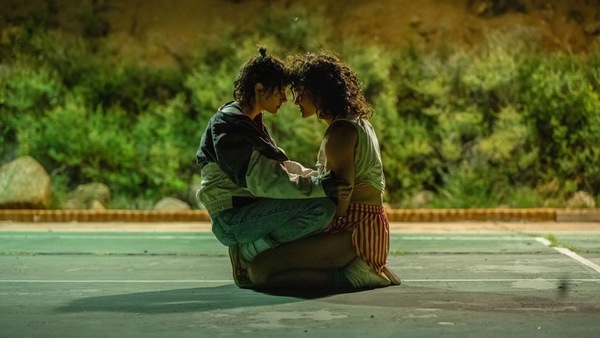
But the film’s recurring visual motif of starry night skies hints at divine intervention. The fever-dream surrealism of their experiences — at one point, Jackie hallucinates that she’s vomiting Lou out as a full-grown baby — feeds the cosmic togetherness of the characters. At a psychological level, Lou is atoning for the sin of driving away her (unseen) mother. She clutches onto Jackie, refusing to leave her side, righting the wrongs of the past with jittery courage. Further, the hulk-like illusion of Jackie doubling in size whenever she’s angry replicates a little girl’s intimidating view of her mother. It’s like Jackie is — freakishly and furiously — manifesting the motherhood that Lou failed to rescue. She is suffering to become Lou’s redemption, and in turn, Lou suffers to become Jackie’s reckoning.
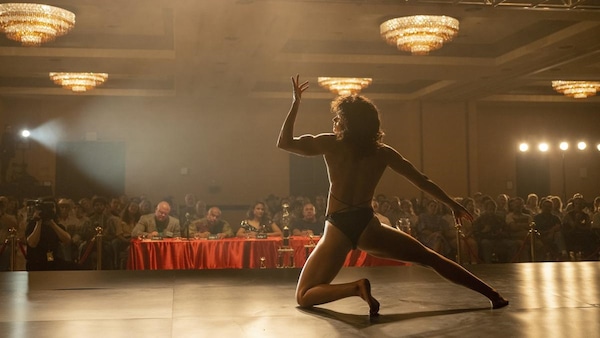
Kristen Stewart, one of the finest actresses of her generation, is in top form as the androgynous Lou. In the “love” stage, she can’t believe her luck. But she goes from worshipping Jackie as if she were a goddess to protecting and stabilising her in a broken heartbeat. The change of body language and power dynamics within the relationship is defined by Stewart’s shapeless performance. Despite her gait, she refuses to be the “man” in the equation; she continues to be a woman in the most fierce and uncomfortable way possible. Katy O’Brian, as Jackie, pulls off the improbable feat of looking daunting and daunted at once. She plays a striver whose innocence is shattered, and her popeye-on-spinach scenes are rarely a sign of her control. It’s like she’s a cautionary tale desperately seeking the assurance of a love story. Together, the actresses turn Love Lies Bleeding into an original blend of disparate tributes.
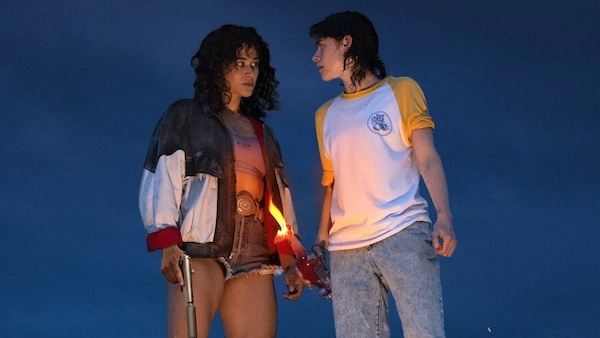
Most of all, Rose Glass’ film pits the endless aesthetic of the female body against the metallic sterility of male violence. The eroticism of their love aside, the brawny resilience of the women defeats the one-note affair between men and their guns. The phrase “weaponisation of their bodies” takes on a faithful meaning. The signs are everywhere. A muscled Jackie is hired as a waitress at a shooting range owned by a criminal who has a history of gunning his rivals down. But it’s a muscled-to-death corpse (talk about “smashing patriarchy”) that triggers the start of the criminal’s downfall: The corpse was once a man who succumbs to the very abuse that he subjected his wife to. Not a single gunshot claims its target in the film: The one time it looks like that, it’s a casual choke that finishes off the job. By choosing their hands over pieces of testosterone-tainted metal, the women reclaim their agency from a world that had reduced them to physical props. After all, their love lies bleeding only because it bites — and devours — the bullet.
